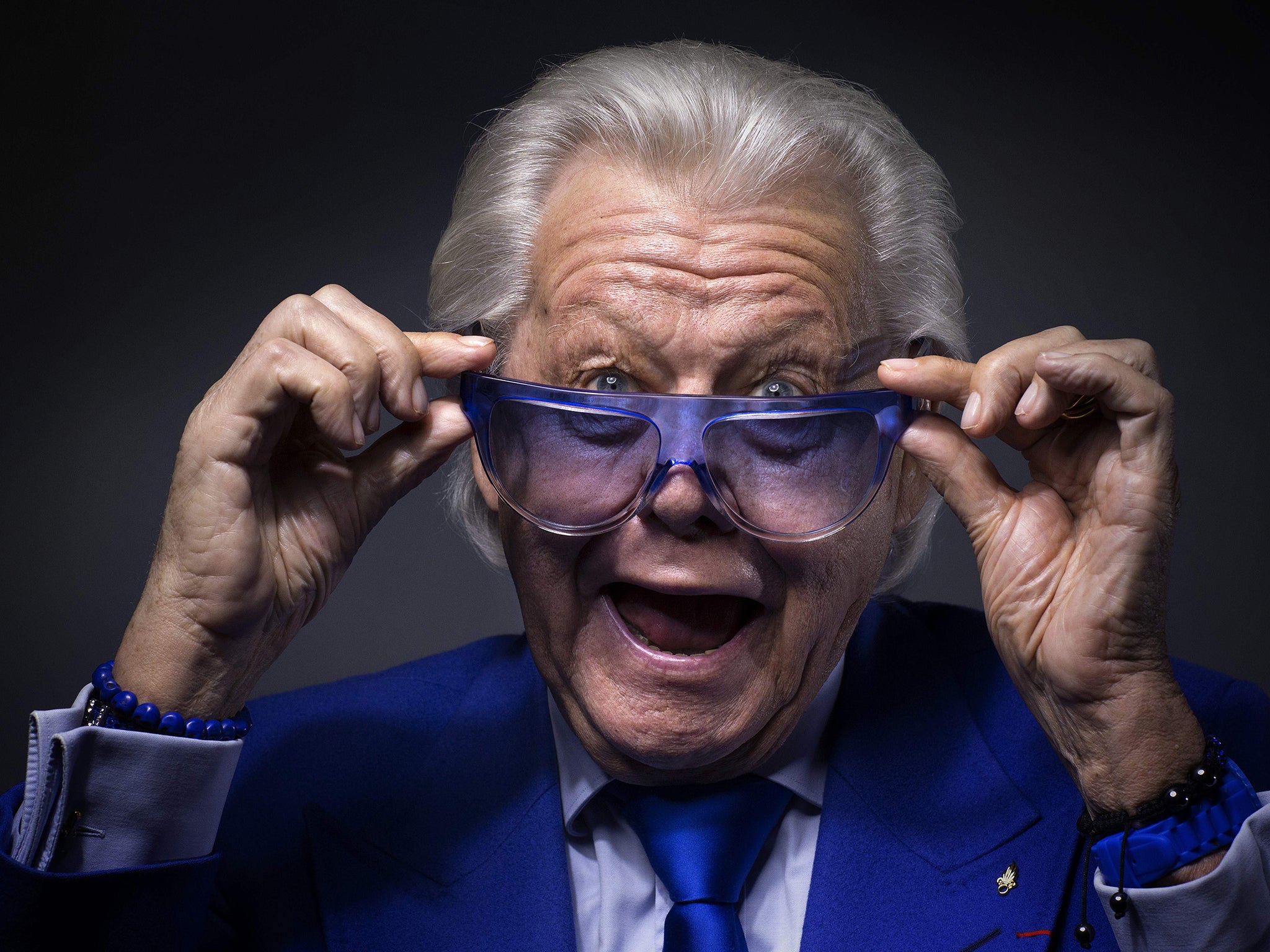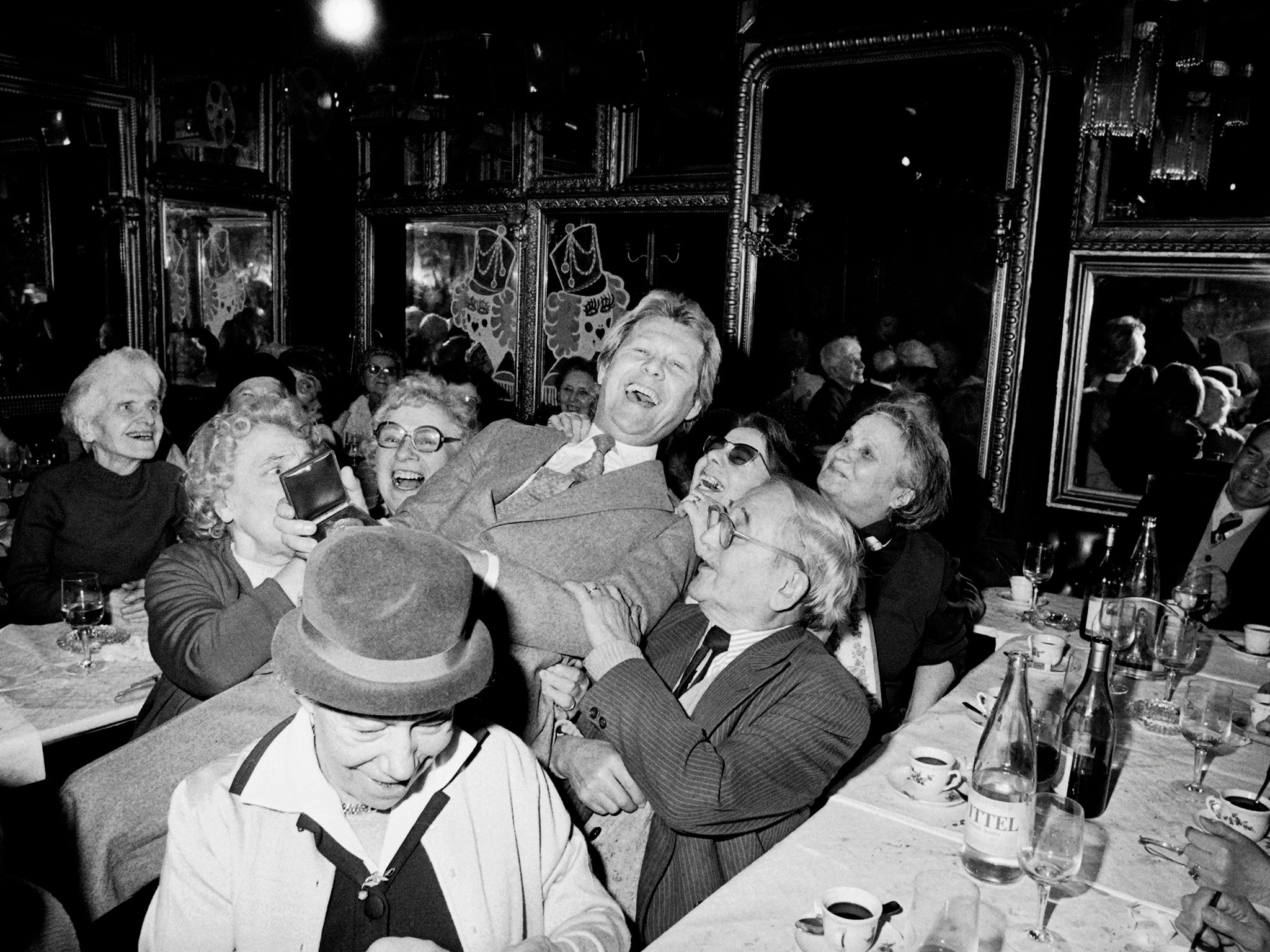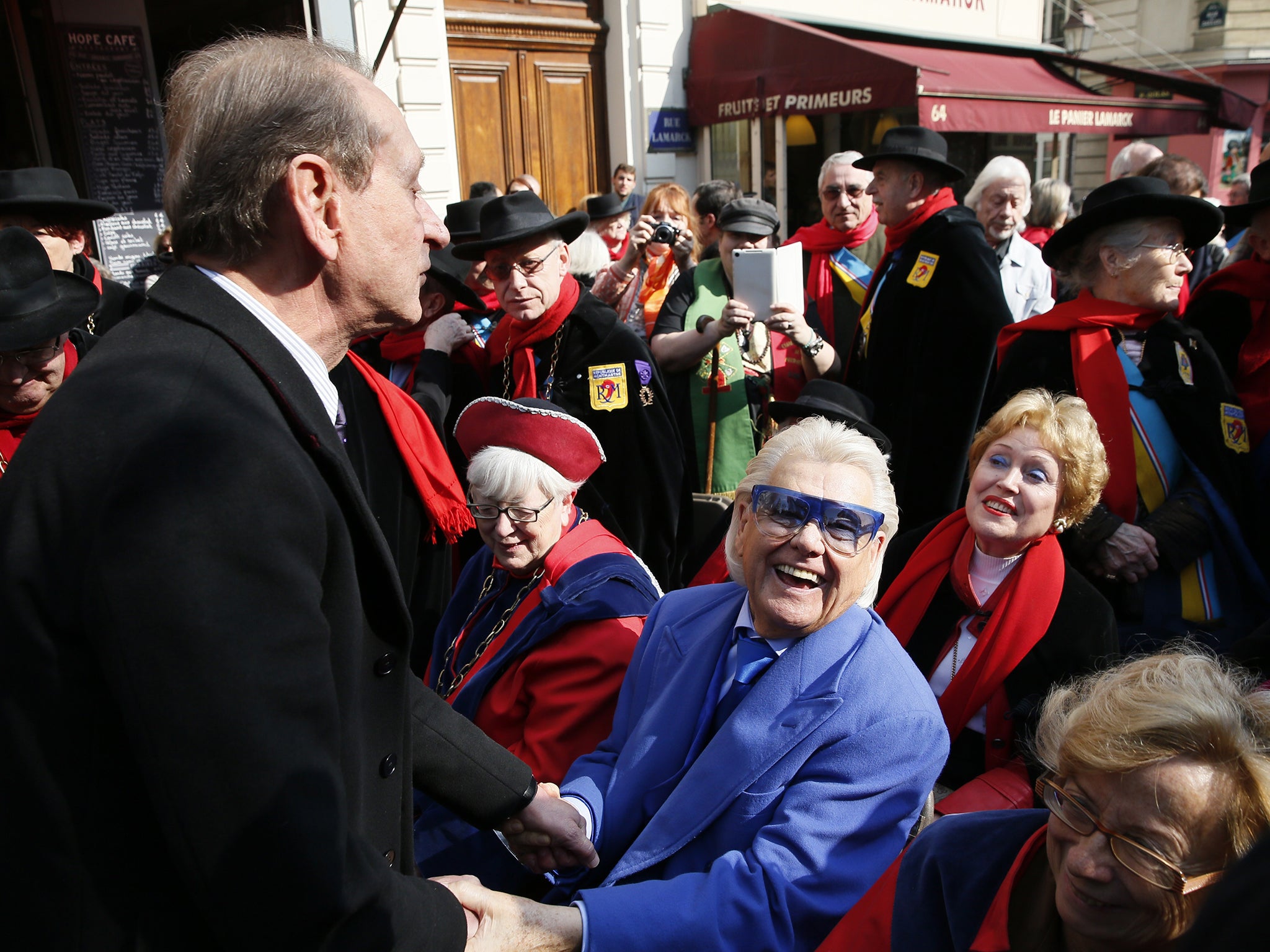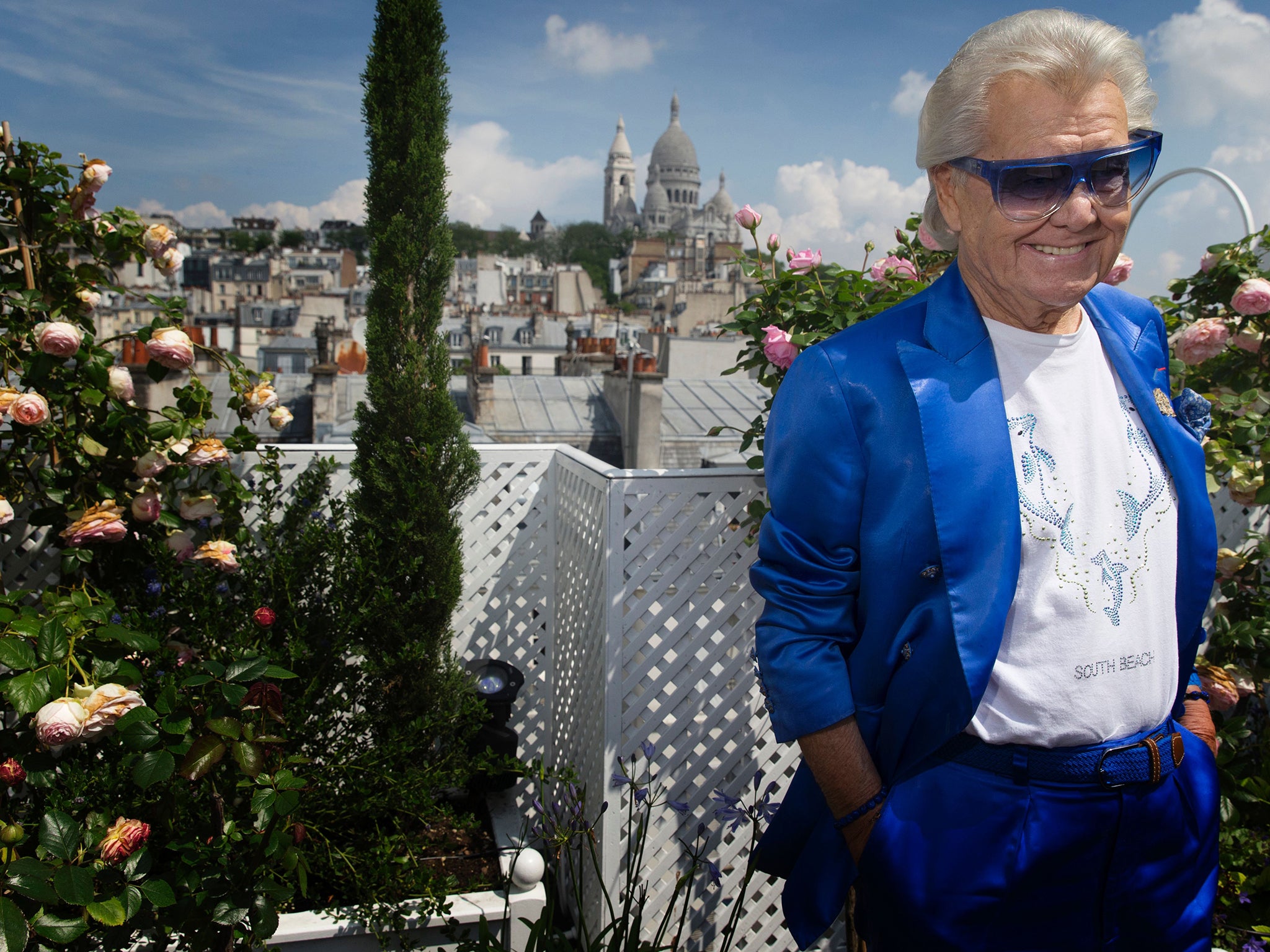Michou: Age is merely a number for the 87-year-old ‘Blue Prince of Montmartre’
‘When I disappear, I want people to remember this place and say, this is where Michou gave people joy,’ the French cabaret owner tells Liz Alderman

Your support helps us to tell the story
From reproductive rights to climate change to Big Tech, The Independent is on the ground when the story is developing. Whether it's investigating the financials of Elon Musk's pro-Trump PAC or producing our latest documentary, 'The A Word', which shines a light on the American women fighting for reproductive rights, we know how important it is to parse out the facts from the messaging.
At such a critical moment in US history, we need reporters on the ground. Your donation allows us to keep sending journalists to speak to both sides of the story.
The Independent is trusted by Americans across the entire political spectrum. And unlike many other quality news outlets, we choose not to lock Americans out of our reporting and analysis with paywalls. We believe quality journalism should be available to everyone, paid for by those who can afford it.
Your support makes all the difference.The man in blue – azure suit, blue-tinted glasses and blue shoes – steps onto the tiny stage of Paris’s best-known drag cabaret, and flashes a wide smile at the crowd.
“I hope you’re enjoying your dinner,” says Michou, an energetic 87-year-old who owns the club.
“If the meat is good, it’s because I slept with the butcher!” he jokes, as a coterie of men wearing lipstick and mascara flock around him. “Thank you for coming,” he adds. “You’ve brought me untold joy.”
A woman stands up. “But it is you who makes us happy!” she shouts, as the audience erupts in applause.
It is a Monday night, but nearly 100 visitors have packed Chez Michou, at the foot of Montmartre, the Paris neighbourhood known for its nightclubs and storied connection with artists like Picasso and Toulouse-Lautrec.
For six decades, Michou has been a fixture of the neighbourhood, presiding over France’s most celebrated “transformiste” spectacle – a parade of performers in drag impersonating Maria Callas, Dalida (an Egyptian-born singer and actress from the 1950s) and a nostalgic list of other female icons.
With elaborate costumes – a red velvet robe for Callas, a bouncy blonde wig for Dalida – and tongue-in-cheek pageantry, the show stands out for its sumptuous kitsch among the universe of French cabarets, which have coloured Montmartre with unbound energy since the Belle Epoque.
Michou is no longer as lithe as when he high-kicked his way into Paris’s cabaret scene, dancing in drag as Brigitte Bardot.
A snowy mane has replaced his blonde locks, and these days, he must lean on his longtime companion, Erwann Toularastel, when navigating Montmartre’s cobbled streets. He is in remission from colon cancer.
Yet in the twilight of his life, this darling of the Parisian demimonde and his club are still attracting large crowds, even while performing an act fine-tuned decades ago.
Dressed habitually in blue, he is instantly recognisable in France, in part from his many TV appearances. During winter, a blue overcoat completes his image, which Michou has cultivated as carefully as Karl Lagerfeld with his signature black glasses and fingerless gloves.
“They call me the ‘Blue Prince of Montmartre’,” Michou says one recent morning in his rooftop apartment, which overlooks Sacré-Coeur and was decorated entirely in blue, down to the turquoise toilet seat in the bathroom.
“Around here, I’m treated like a saint,” he grins.

When Michou first set foot in Montmartre in the 1950s, it was a cheap bohemian area, home to artists, writers and performers, as well as beggars and an ethnically mixed working class.
These days, the neighbourhood gleams with an expensive gentrification. Selfie-taking tourists swarm to trinket sellers, souvenir stores and cafes parading as Instagrammable replicas of the Montmartre that once was.
In the midst of all this, Michou has stayed true to his roots – a trait that has won him a loyal following among the neighbourhoods’ longtime denizens.
Once a month, he is host to free luncheons at his cabaret for an adoring coterie of older Montmartroise, local residents who seem to have known each other for years and whose tight bonds keep Montmartre an authentic Parisian village beneath the tourist crowds.
Together, they enjoy a champagne-filled afternoon of joie de vivre, while clinging to the nostalgia of a bygone era.
But Michou also counts famous politicians, actors and singers as friends. His cabaret is jammed with photos of himself hugging Jacques Brel, Sophia Loren and France’s former president, Jacques Chirac, who awarded him the Legion of Honour, the country’s highest order of merit.

At his home, Michou lifts a blue crystal glass filled with champagne. He drinks two bottles daily, he confides, a habit that prompted a former first lady, Bernadette Chirac, a close friend, to admonish him.
“I don’t smoke, and I don’t do drugs,” he recalls telling her. “At least leave me the pleasure of champagne!”
“He is a French institution,” says François Soustre, a French writer who is the co-author of an autobiography of Michou. “No one else has run their own cabaret for over 60 years. As an openly gay performer, he helped open doors to liberate others. And he started from nothing.”
Michou was born Michel Catty in June 1931 in Amiens, an industrial town in northern France, and raised by his mother and grandmother.
At age 19, he told his mother he was attracted to other men.
“What would you say if I was a homosexual?” he recalled asking, with trepidation. “If you’re happy, that’s all I care about,” she responded.
He moved to Paris soon after, settling near the Moulin Rouge, Paris’s most storied cabaret. It was a formerly gay area that had given way to prostitutes and sex shops.
He found work at a small cafe on rue des Martyrs and befriended the owner, Madame Huguette. He bought the cafe from her and transformed it into a dinner theatre featuring himself and two friends as dancers.
“I did the cooking, the cleaning and the dancing,” Michou says.
They parodied the day’s big female stars, especially Dalida and Bardot. After a newspaper review, Dalida came to see the show. “She loved it,” Michou recalls.
These days, whether the lineup should evolve to account for newer stars – the way it has at Moulin Rouge, the Lido and Paris’s biggest cabarets – is a touchy subject.
“We’ve managed to make Michou’s show a bit younger,” says Oscar Boffy, the artistic director, citing new acts that imitate the sultry French singer Patricia Kaas, who became a star in the late 1980s, making the show a little more contemporary.
But for Michou, rooted in nostalgia, adjustment isn’t easy.
“Times may change, but Michou doesn’t,” says Catherine Beaudelain, his niece. “He says things will stay the same as long as he’s around. And he’s the captain on this ship.”

On a recent evening, Michou positions himself in the nightclub’s bustling hall where he can view his fans – and his fans can view him.
His hair is coifed in a lustrous dome, the result of a daily blowout at the Alexandre de Paris salon. He raises a glass with freshly manicured fingers and toasts the audience.
As fans approach, asking him to sign his autobiography, he moves to a small table in the hallway and settles beneath a photo of himself with Brigitte Macron, the wife of the French president.
“It’s for my mother,” a middle-aged woman says. “She’s from Amiens, like you,” Michou picks up a blue pen and begins to scribble.
“Please take good care of yourself,” another woman pleads. “You bring bonheur to so many. We want you around for a long time!”
After the signings, Michou leans back and takes a last swig of champagne. The show is halfway over.
“I’m going to go back home to eat some soup,” he says. “I need my strength, to be ready for tomorrow night.”
He pauses and glances at a flame flickering atop a blue candle.
“You know, I’m 87,” he continues, his voice growing suddenly serious. “Life will soon be over for me. But I can say that I‘ve found happiness every single night that I’ve been here.”
“When I disappear,” he adds, “I want people to remember this place and say, ‘This is where Michou gave people joy’.”
© New York Times
Join our commenting forum
Join thought-provoking conversations, follow other Independent readers and see their replies
Comments